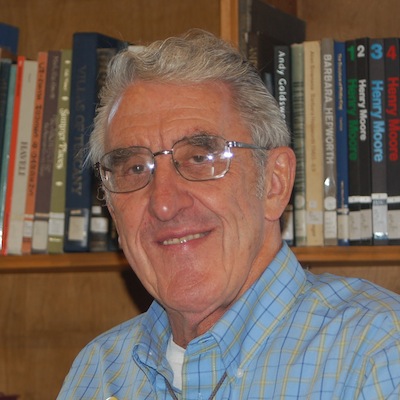Ronald E. Santoni is the Maria Theresa Barney Chair Emeritus of Philosophy at Denison University in Ohio and is a Life Member of Clare Hall, Cambridge University. He received his B.A. degree from Bishop’s University in Canada, his M.A. from Brown University and his Ph.D. from Boston University. He has been a Visiting Scholar (1986, 1990, 1994, 1997, 1999, 2001, 2004, 2006, 2008) and a Visiting Lecturer (1990) in The Faculty of Philosophy at University of Cambridge, England; a member of the High Table at King’s College, Cambridge (1999); a Visiting Fellow at Clare Hall, Cambridge (1986); a Royal Society of Canada Overseas Fellow at the University of Paris (Sorbonne); and, on five occasions, either a Research Fellow, Visiting Fellow, or Visiting Scholar at Yale University. He continues as an Associate Fellow of Berkeley College, Yale University.
In addition to his book on Sartre, titled Sartre on Violence – Curiously Ambivalent (Penn State University Press, 2003, 2004), he is author of Bad Faith, Good Faith, and Authenticity in Sartre’s Early Philosophy (Temple University Press, 1995), co-editor of the Doubleday Anchor book, Social and Political Philosophy, editor of Religious Language and The Problem of Religious Knowledge, and is contributing author to eighteen books, including Current Issues in Philosophy; Towards the Understanding and Prevention of Genocide; Nuclear War: Philosophical Perspectives; Genocide: A Critical Bibliographic Review; The Institution of War; Just War, Nonviolence, and Nuclear Deterrence; Violence and Human Co-existence; Hiroshima’s Shadows; Jean-Paul Sartre – Das Sein und Das Nichts (which constitutes a detailed analysis of each part of Being and Nothingness by a group of 13 international scholars) (2003, 2014); Über Sartre: Perspektiven und Kritiken (2005); Sartre Today: A Centenary Celebration (2006); Sartre: Le Philosophe, l’intellectuel, et la politique (2006), Pourquoi Sartre? (2005) and Lebendiger Sartre (2009) (in which he offers tributes to Sartre), and Revolutionary Hope (2013), and Living Existentialism.
A scholar of the philosophy of Jean-Paul Sartre, Santoni has also published over 165 articles, commentaries and reviews in diverse professional philosophical journals and national magazines. His articles have appeared in journals in England, Russia, Germany, Poland, Sarajevo and France, as well as in North America. In addition, he has presented numerous papers and commentaries on Sartre and other philosophical topics at national and international meetings of professional philosophical societies. In June 2004, he presented a paper at The University of Paris (Sorbonne) following the “presentation” by Michel Rybalka of his new book, Sartre on Violence – Curiously Ambivalent. In May 2005, he was one of the two invited American scholars to speak at an International Conference at Université D’Amiens/Picardie in France, honoring the centenary of Jean-Paul Sartre’s birth. In March 2011, he was one of the six invited international scholars – and one of two North American philosophers – to present a paper at a special two-day roundtable colloquium focusing on Sartre’s philosophy, held at the University of Lucerne in Switzerland (Universität Luzern), of which he was guest for three days. The papers of the international colloquium – called “Zur Aktualität Jean-Paul Sartre: Philosophie, Literatur, Politik” – are forthcoming in a book titled, “Aspects de l’Actualité de Jean-Paul Sartre (his paper is titled “L’Actualité de la ‘mauvaise foi’ dans l’oeuvre de Sartre – et son influence rétentissante” (“The Pervasiveness of ‘Bad Faith’ in Sartre’s Oeuvre – and the Continuing Impact of It”). In June 2014, he was one of the four American Sartre scholars whose work on Sartre was honored at a conference held in St. Louis on The Diverse Lineages of Existentialism.
Committed to the integration of scholarship with social concern, Santoni has been an invited speaker at national and international conferences dealing with the morality of violence, war, human co-existence, and nuclear deterrence. He has been past President of both Concerned Philosophers for Peace and International Philosophers for the Prevention of Nuclear Omnicide (IPPNO) (now called International Philosophers for Peace), as well as Vice-president of American and Japanese Professionals Against Nuclear Omnicide (American Division). In 2006, he rejoined the membership of the National Executive Committee of Promoting Enduring Peace, a committee on which he had previously served for more than a decade. In Spring 1964, he was hanged in effigy at the entrance to Wabash College in Crawfordsville, Indiana (an honor for which he is proud) for questioning and standing up to the professional anti-communist agitator and American folk hero, Herbert Philbrick, of the television series and book “I Led Three Lives” fame.
A member of the Executive Committee of The North American Sartre Society and coordinator of the Sartre Circle, he has also been on the Executive Committee of the Institut für Axiologische Forschungen, and a member of the International Advisory Council of the Institute of the Holocaust and Genocide in Jerusalem. Further, he has been a member of the Board of Editors of the Journal for Peace and Justice Studies and a consulting referee for other professional journals and presses.
In June 2014, Santoni was honored at a major Conference entitled “The Diverse Lineages of Existentialism,” held in St. Louis, Missouri, June 19-21, 2014. A special session of the Conference was dedicated entirely to his extensive scholarship on Sartre and basic issues related to Sartre’s prolific oeuvre.
His biography has been included in Who’s Who in the World, Who’s Who in America, Who’s Who in American Education, Directory of American Scholars, Contemporary Authors, among other national and international biographical reference books.
Ron was married for 62 years to Marguerite Kiene Santoni, an exemplary, exceptionally caring, wife and life partner. They had six loving children who, taken together, have produced for them a creative yield of thirteen inquiring and affectionate grandchildren. Ron and Margo have been members of the Open Door Community in Atlanta, GA, a community that cares for the homeless, hungry, imprisoned, and all other oppressed persons ignored or marginalized by the American economic and judicial systems. Ron was a non-residential Partner of the organization, which has now relocated in Baltimore, MD.

